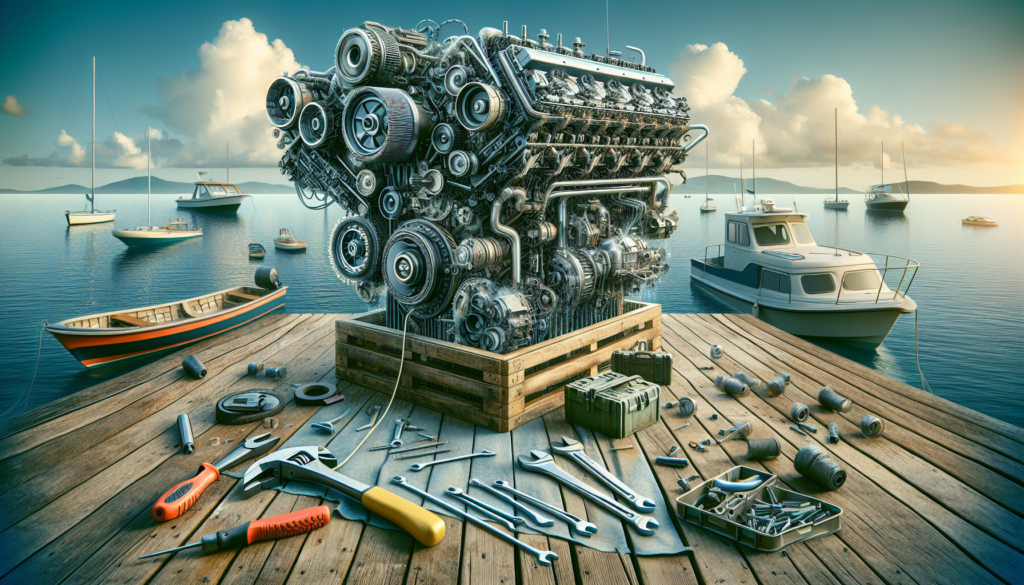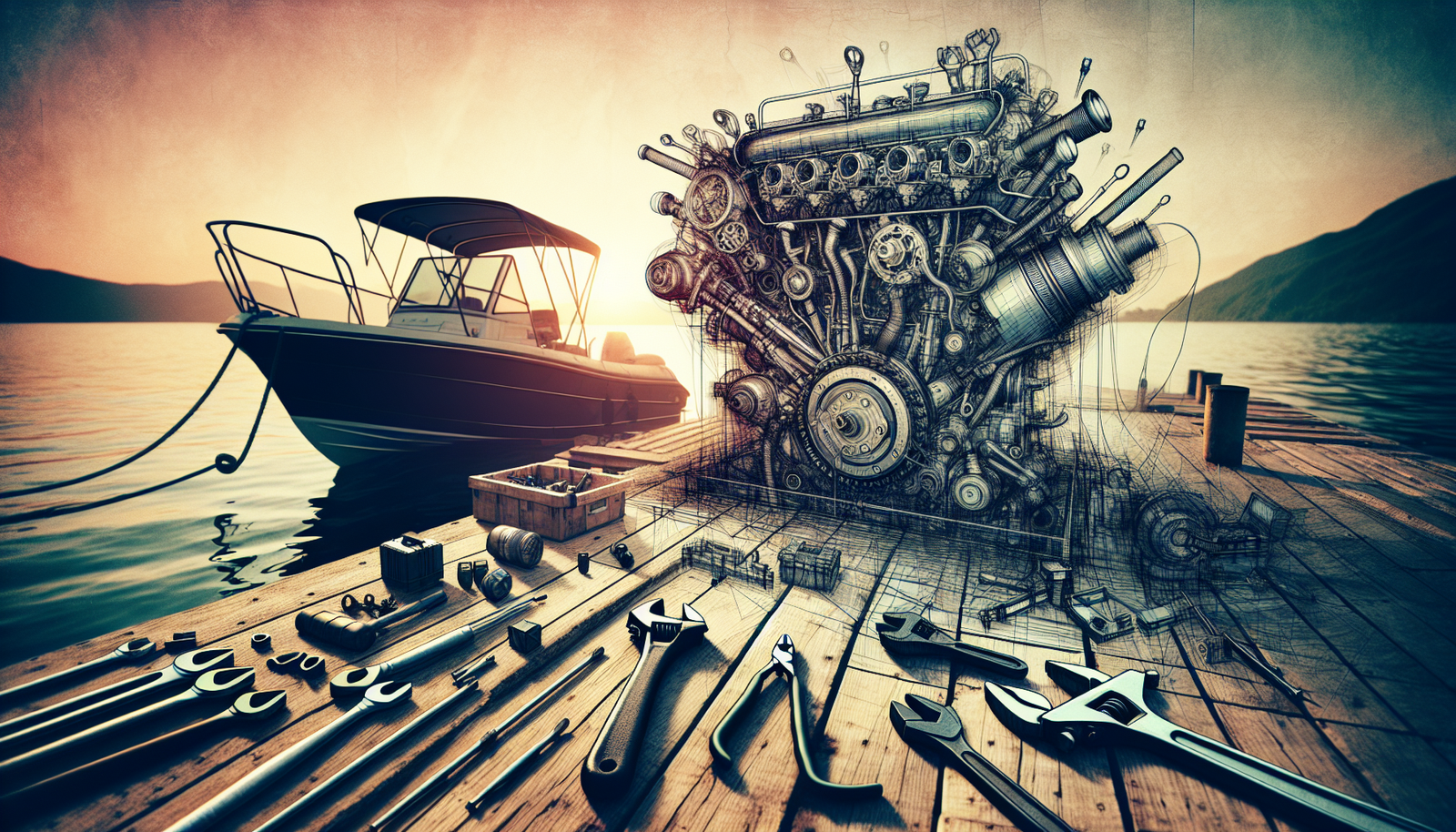Whether you’re an experienced skipper or a new boater, the thought of engine failure while at sea is quite daunting. To help you forestall such situations, the article “What Are The Most common boat engine problems and How to Avoid Them?” sheds light on the typical issues that plague boat engines. It provides you with useful insights into recognizing the warning signs early and equips you with preventative measures against these common malfunctions to keep your vessel in optimal condition. You’ll find invaluable advice aimed at ensuring your seafaring adventures run as smoothly as possible without any abrupt disruption due to engine problems.

Overheating Boat Engine
When you’re out on the water, the last thing you want to deal with is an overheating boat engine. It’s a problem that can lead to major engine damage and ruin a day of boating fun if not handled correctly.
Causes of Overheating
A boat engine can overheat for several reasons. The most common cause is a problem with the cooling system. The cooling system can be obstructed by debris or simply fail to function properly due to age and wear. Inadequate coolant levels, a faulty water pump or thermostat can also contribute to overheating.
Signs of an Overheating Engine
An overheating engine usually gives some warning signs before completely breaking down. The most obvious is an unusually high engine temperature gauge reading. Other signs can be steam coming from your engine, or engine failure while running. If you notice any of these signs, it’s crucial to get your boat engine checked immediately.
How to Prevent Overheating
To prevent overheating, ensure that your cooling system is clean and working properly. Regular inspections to look for debris or potential blockages are advised. Keeping an extra eye on the temperature gauge when you’re out on the water can also keep you alert to any issues before they become major problems.
Fuel System Issues
Fuel system issues are another common problem that can be a major headache for boat owners. They can potentially lead to engine failure and expensive repairs if not addressed promptly.
Fuel contamination problems
Everyone knows that water and fuel simply don’t mix. However, in a boat’s fuel system, water contamination can occur. This can lead to engine misfire, difficulty starting or even complete engine failure.
Corrosion in the fuel system
Another common fuel system issue is corrosion, usually caused by moisture buildup. Corroded fuel system components can lead to leaks, which not only wastes precious fuel but can also be a potential fire hazard.
How to Maintain Fuel System’s Health
To maintain your boat’s fuel system, consider using fuel additives designed to inhibit corrosion and treat water contamination. It’s also important to regularly inspect your fuel system for any visible signs of corrosion or leaks.
Oil-Related Issues
A boat engine needs oil to function properly, just like any vehicle engine. Keeping your engine well-oiled can prevent a raw of common boat engine problems.
Low Oil pressure
Low oil pressure is a warning sign that shouldn’t be ignored. It generally indicates a problem with the oil pump, a clogged oil filter, or simply low oil levels in the engine.
Oil Contamination
When debris or water gets into the engine oil, it becomes contaminated and can cause extensive damage to the engine’s components.
Importance of Regular Oil Change
Regular oil changes are essential to keep your boat engine running smoothly. They ensure that your engine oil is clean and free from any potential contamination. It’s also crucial to always keep an eye on your oil pressure and levels to prevent any major damage to your engine.

Failure in Ignition System
A boat’s ignition system is critical for starting the engine. Failure in this system can leave you stranded on the water.
Causes of Ignition System Failure
Ignition system failure can be caused by several issues. Faulty or worn-out spark plugs and wires are a common cause. Moisture or corrosion in the system can also lead to problems.
Signs of a Failing Ignition System
If your boat engine struggles to start or suddenly dies while running, it could point to a failing ignition system. Other signs could be a lack of power or repeated stalling.
How to Maintain Ignition System
Regular maintenance of the ignition system can prevent many common problems. This includes replacing the spark plugs and wires at recommended intervals. In addition, keeping the ignition system clean and dry can avoid moisture-induced problems.
Electrical System Malfunction
A boat’s electrical system controls many functions of the engine and other boat systems. Any malfunction in this system can lead to a range of problems, including engine failure.
Common Electrical Problems in a Boat Engine
Common electrical problems include battery issues, faulty wiring, and failing regulators or alternators. These issues can cause power loss, engine failure, or other serious issues.
Hazards of Electrical System Failure
Electrical system failure can result in a dead engine, loss of lighting or navigation systems and even a potential fire risk in severe cases.
How to Prevent Electrical System Malfunction
Preventing electrical system problems requires regular maintenance and inspection. This includes checking the alternator and regulator, as well as inspecting for any signs of corrosion or damaged wiring.
Propeller Problems
Propellers are critical for moving your boat through the water. Any problems with propellers can impact your boat’s performance and potentially damage the engine.
Signs of Propeller Damage
If your boat struggles to accelerate, vibrates excessively or shows decreased fuel efficiency, it might be worth checking your propellers for damage. Visible dents, cracks or missing blades are clear signs that your propeller needs attention.
Impact of Damaged Propellers on Boat Engine
A damaged propeller can cause undue stress on the boat engine. This can lead to overheating, engine failure and other severe problems.
Maintaining and Checking Your Propeller Regularly
Advanced wear and tear can often be prevented by regularly inspecting and maintaining your propellers. Catching and fixing issues early is the key.
Faulty Cooling System
The cooling system plays a crucial role in preventing your boat engine from overheating.
Causes of a Faulty Cooling System
The cooling system can become faulty due to a number of issues. These include blockages in the system, leaking coolant, and a failed water pump or thermostat.
Effects of a Faulty Cooling System on the Boat Engine
A faulty cooling system can quickly lead to an overheating engine. Over time, this can cause severe engine damage or failure.
How to Maintain the Boat’s Cooling System
Regularly check the coolant level in the boat, ensure all hoses and connections in the cooling system are secure, and keep the heat exchanger clean to avoid blockages.
Bad Boat Battery
A boat’s battery is another crucial component that can lead to engine problems if it’s in bad shape.
Signs of a Bad Battery
If your boat engine struggles to start or fails to start at all, it could be a sign of a bad battery. Other signs include dim or flickering lights and low power output.
Impact of a Bad Battery on Boat Engine
A bad battery can prevent your engine from starting at all. Even if the engine does start, a bad battery can lead to weak engine performance or sudden engine stoppage.
How to Properly Maintain a Boat Battery
Proper battery maintenance involves regular cleaning and checking of battery connections, and ensuring the battery is kept fully charged. Regular battery testing can also help in detecting any potential problems before they become major issues.
Impeller Failure
Impellers are crucial components of the cooling system and their failure can lead to overheating.
Why Impellers Fail
Impellers can fail due to age and wear, or due to debris getting caught in them. Overheating can also cause them to fail prematurely.
Effect of Impeller Failure on Boat Engine
A failed impeller can cause a blockage in the cooling system, leading to an overheating engine. In worst cases, this can result in severe engine damage or failure.
When and How to Replace an Impeller
Impellers should be replaced at regular intervals based on the manufacturer’s recommendations. Proper replacement involves disassembling the pump housing, removing the old impeller and installing a new one.
Belt And Hose Damage
Damage to belts and hoses can lead to various engine problems, including overheating.
Causes of Belt and Hose Damage
Belts and hoses can suffer damage due to age, wear and tear, improper tension or exposure to harsh environmental conditions.
How Damaged Belts and Hoses Affect a Boat Engine
Damaged belts and hoses can cause loss of power, overheating, and total engine failure if the damage is severe enough. This is due to their crucial role in various engine systems, like the cooling and charging systems.
How To Check and Replace Belts and Hoses
Belts and hoses should be regularly checked for any signs of wear and tear, including cracks, fraying, and leaks. They should be replaced at the first sign of any damage, following the manufacturer’s instructions. Regular maintenance can prevent many common boat engine problems and ensure your boat keeps running smoothly on the water.

